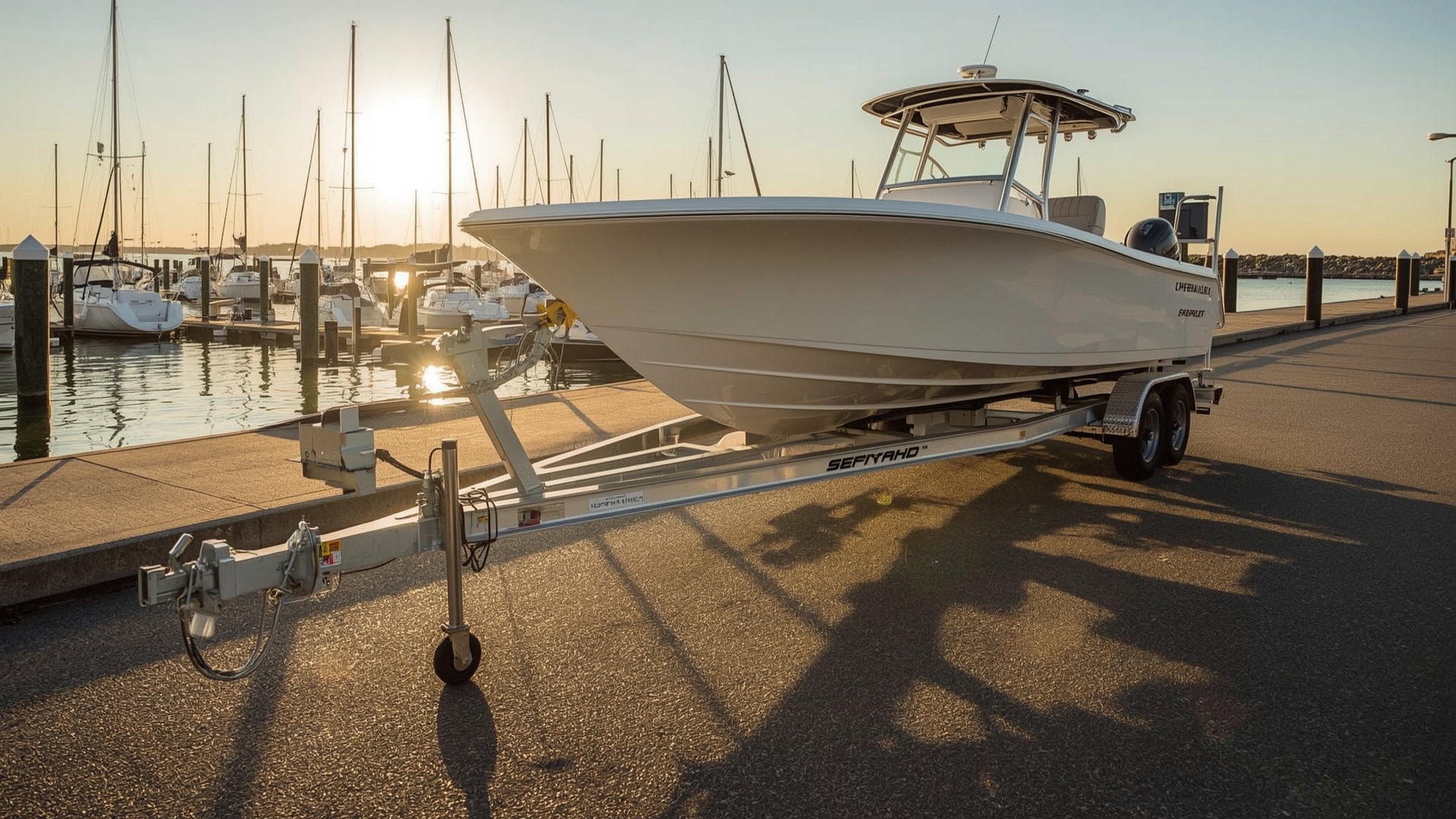Boat trailer maintenance doesn’t have to be complicated or time-consuming—sometimes, the smallest habits deliver the greatest results. These hacks are engineered for busy, tech-minded pros who value efficiency and smart safety. Scan these insights before your next tow and ensure every launch goes off without a hitch.
- Make preventative checks a ritual—regular “walk-arounds” and basic inspections catch 90% of costly breakdowns before they happen.
- Embrace maintenance workflows with tech—use checklists, reminders, and mobile apps to automate key steps and keep routine care effortless.
- Prioritize tire and bearing health—over 40% of trailer failures are tire-related; pressure checks and greased bearings are your top line of defense.
- Never skip post-trip rinses—especially after saltwater; fast, thorough cleaning with eco-friendly products and corrosion blockers can extend trailer life by 30%.
- Adopt a pre-trip checklist for safety—verify load balance, secure straps, tire pressure, and all lights before every journey to slash accident risks.
- Leverage smart upgrades like LED lights and tire sensors—simple retrofits cut roadside incidents by up to 60% and boost peace of mind.
- Log and act on inspection findings digitally—tracking wear, repairs, and upcoming to-dos in an app means fewer surprises and higher resale value.
- Stay ahead with new materials and IoT tools—corrosion-resistant hardware and real-time monitoring turn trailer care from a guessing game into a science.
Want every trip to start (and end) with confidence? Dive into the full guide to future-proof your towing game and never let maintenance catch you off guard.
Introduction
Ever pull up to a boat launch only to discover a blown tire, fried lights, or a rusty hitch that just won’t budge? If so, you’re painfully aware—90% of trailer breakdowns stem from overlooked upkeep that takes less than five minutes to check.
Yet, with just a few strategic shifts, you can transform trailer maintenance from a dreaded chore into an effortless, tech-powered workflow—saving hundreds on repairs and reclaiming hours of adventure time.
It’s not just about swapping grease or spotting rust. Today’s savvy trailer owners are blending high-impact routines with digital checklists, smart sensors, and workflow hacks. The result? Fewer surprise repairs, a longer trailer lifespan, and that priceless peace of mind whenever you hit the road.
Curious how this mindset pays off? Imagine cutting out:
- Last-minute tire changes (or worse, tow truck calls)
- Costly fines from faulty lights or missing safety chains
- Scrambling for replacement parts when corrosion sneaks in
Instead, you’re leveraging routines, reminders, and even AI-driven tools to keep every haul as smooth as your first.
This guide zeroes in on what matters most—practical hacks, preventative routines, and must-know upgrades—all tailored for tech-comfortable doers who expect more from their gear (and their time).
Ready to future-proof every tow, save real money, and spend more weekends on the water (instead of the shoulder)? Let’s build your boat trailer maintenance workflow—starting with the essentials every smart hauler needs to know.
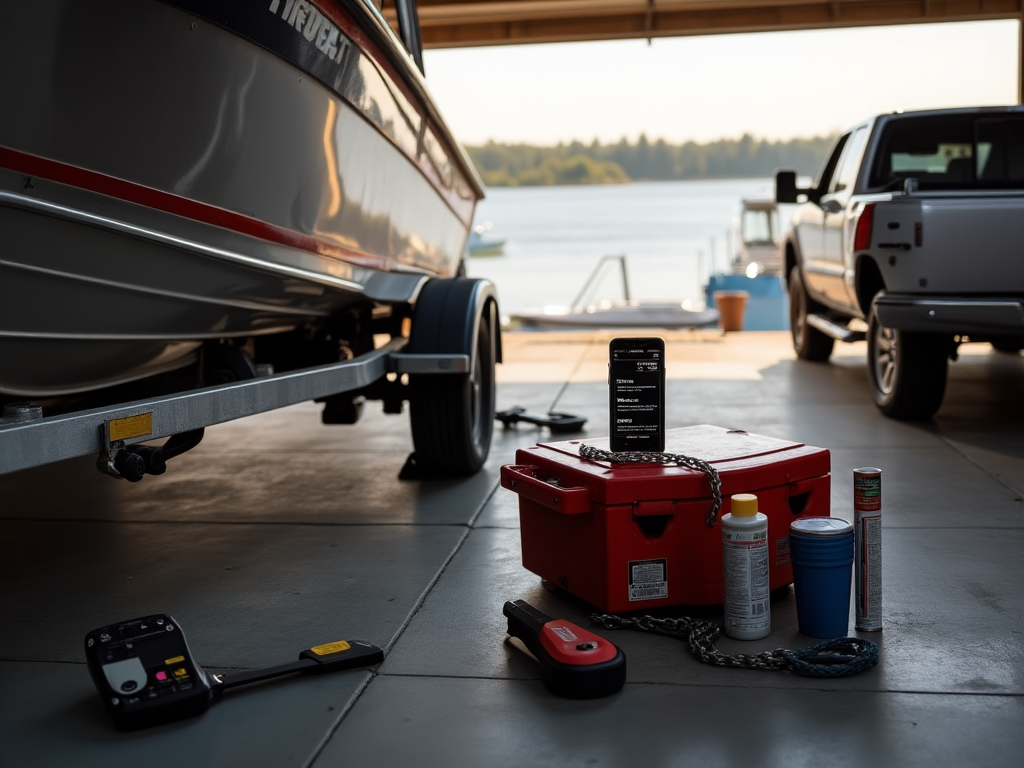
Building Your Boat Trailer Maintenance Mindset: Essentials for Effortless Towing
Picture this: you’re halfway to the launch and you hear the horrible flap of a shredded tire. Now you’re late, frustrated, and facing a repair bill that easily could’ve been avoided with five minutes of prep. Adopting a preventative maintenance approach isn’t just smart—it’s essential for anyone who hauls a boat, whether once a season or every weekend.
Why Every Tow-Ready Pro Loves Prevention
Regular, simple checks catch 90% of the issues that strand trailers on the roadside. Tackle tire problems, burnt-out lights, and rusty hitches before they happen—routine care increases trailer lifespan by up to 30% and slashes emergency costs.
Here’s how regular maintenance pays off:
- Fewer breakdowns: Each quick “walk-around” slashes the risk of a trip-ruining failure.
- Cost savings: Avoid $150+ roadside tire changes and $400+ bearing repairs with simple inspections.
- Peace of mind: Know your gear is reliable, so you stay focused on the water—not the worry.
Workflow Wins: Maintenance as a System, Not a Chore
Treat trailer care as a workflow, just like your favorite project management app. Checklists, reminders, and mobile apps automate the boring stuff and guarantee you never miss a step.
Steal these workflow hacks for instant results:
- Use smartphone reminders to schedule seasonal deep-dives
- Keep a digital log of inspections in your notes app or cloud folder
- Take photos of wear or corrosion for easy tracking over time
Pain Points and Pitfalls: Avoid the Classics
Let’s talk mistakes—because nobody wants to repeat them. The top blunders costing boaters time and money are:
- Ignoring tire pressure (leading cause of blowouts)
- Skipping post-saltwater rinses (corrosion shows up in weeks, not months)
- Overlooking brake fluid levels (silent leaks = sudden failure)
- Neglecting safety chains and hitch locks (big fines and bigger dangers)
Quick-Take: Smarter Mindset, Smoother Hauls
The best maintenance plans are built on regular checks, smart reminders, and learning from mistakes—before they’re yours. Commit to a workflow and you’ll not only protect your investment, but also guarantee every trip starts—and ends—on your terms.
“A boat trailer is only as reliable as the owner’s last checklist—skip the guesswork, not the maintenance.”
The Fundamentals of Trailer Health: Routine Inspections and Cleaning
Daily and Pre-Trip Visual Checks
Before you hitch up, a quick “walk-around” can save your day—and your wallet.
Take 30 seconds to inspect these essentials every single time:
- Tires: Check pressure, tread, and look for cracks or bulges
- Lights: Confirm brake, signal, and running lights are working
- Hitch and Coupler: Inspect for a secure fit and visible rust
- Safety Chains: Ensure correct attachment and no rust
- Visible Rust & Damage: Scan the frame, bunks, and hardware
These routine checks reduce risk of blowouts, compliance issues, and costly delays.
Picture this: catching a slow tire leak or rusty chain during your morning gear check—avoiding both a ticket and roadside disaster.
“A 60-second walk-around beats a six-hour roadside setback every time.”
Cleaning as the First Defense Against Corrosion
Saltwater is brutal on trailers—it can speed up rust five times faster than freshwater.
After every launch, especially in saltwater, follow this rinse-down routine:
- Freshwater Use: Hose down the entire trailer, wheels, and undercarriage
- Saltwater Use: Thorough rinse, focusing on frame, brakes, wiring, and bunks
- Key Areas: Target the axles, leaf springs, electrical connects, and winch
Use these pro cleaning hacks:
- Eco-friendly soap and soft-bristled brushes for hard-to-reach zones
- Corrosion-blocking sprays (apply to connectors and unpainted metal)
- A leaf blower or towel to remove lingering moisture before storage
“Think of saltwater like glitter—if you miss a spot, you’ll see it later.”
Annual and Deep-Dive Inspections
Some things need more than a surface glance. Schedule annual reviews and tackle potential problems before they escalate.
Add these checklist items to your calendar (or digital reminder):
- Bearings: Grease and check for heat or noise
- Brakes: Inspect pads/shoes and fluid
- Bunks & Springs: Look for wear, rust, or loose fasteners
- Winch: Inspect gears and lubricate as needed
Track inspection results in your phone notes or use a maintenance app. Noticing that bearings are heating up faster this year? Document it—it’s actionable data.
“Little details logged today become money saved tomorrow.”
Spending just a few minutes on consistent checks and cleaning dramatically lowers your chance of roadside trouble or surprise repairs. Make these steps your new pre-adventure habit—your future self (and your tow vehicle) will thank you.
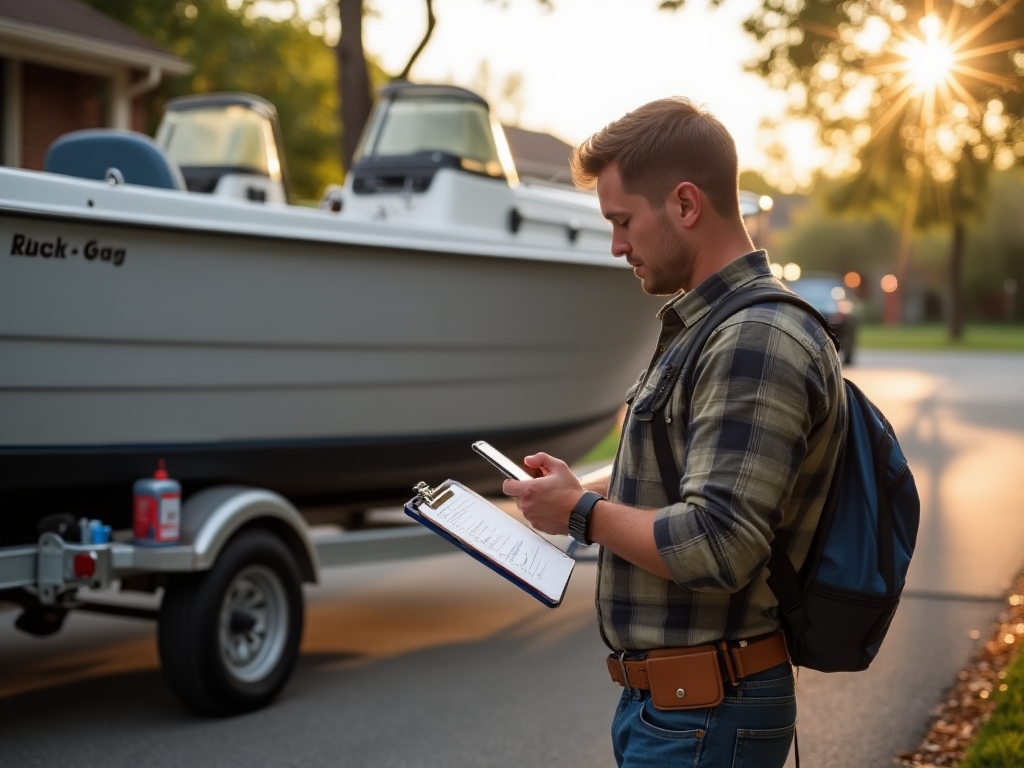
Core Maintenance Areas: Practical Hacks for Major Components
Tires and Wheel Bearings: Your Safety Foundation
Blowouts on the highway aren’t just annoying—they’re dangerous and expensive. Over 40% of trailer breakdowns are tire-related, and overlooked issues can lead to legal headaches.
Make tire care routine with this fast checklist:
- Check tire pressure before every trip (refer to your tire’s sidewall for PSI)
- Look for cracks, bulges, and tread wear
- Replace any tire over 6 years old, even if it looks fine
- Always carry a fresh, inflated spare
Don’t let bearings sneak up on you. Touch your hubs at every gas stop; hot to the touch? That’s a red flag for dry bearings.
- Grease bearings every 3-6 months, more often for saltwater use
- Use temperature checks and listen for squeaks or grinding
- Replace bearings if you see metal flecks or milky grease
Picture this: You’re midway to the lake and notice one tire sitting flatter than the rest—catch it early, solve it painlessly.
“Tire and bearing care buys you reliability…and peace of mind.”
Brakes and Brake Fluid: Reliable Stopping Power
Not all trailers have brakes, but where required, maintenance is non-negotiable. Both surge and electric systems demand attention to prevent loss of control.
- Inspect pads/shoes every 2-3 seasons (or 12,000-15,000 miles)
- Check brake fluid at least three times a season for color/level
- Spot any fluid drops or leaks? Schedule repairs NOW
After any saltwater launch, thoroughly rinse your entire brake assembly. Watch for warning signs:
- Spongy brakes
- Unresponsive stops
- Scraping or grinding sounds
Ignoring brake issues? That’s a shortcut straight to a failed inspection—or worse.
“Good brakes don’t just stop your trailer, they protect your investment.”
Lighting and Electrical: Visibility and Compliance
Visibility makes or breaks towing safety—and tickets. Before every drive, test all lights:
- Brake lights, turn signals, running lights—every time
- Spray connectors with corrosion-blocker and store covered when idle
- Scan for loose, exposed, or frayed wires
Upgrading to LEDs or smart lighting reduces hassle and boosts reliability—no more last-minute bulb changes at dusk.
Visual moment: Flickering taillights at a road stop? Don’t be that hauler—stay lit and legal.
Hitch, Coupler, and Safety Chains: Security Essentials
Every connection counts when your trailer’s in motion. Inspect each vital point:
- Check for rust, cracks, and secure fit on the hitch, coupler, and ball
- Lubricate the coupler with marine-grade grease
- Cross safety chains under the hitch and check the weight rating
Double-checking here can save you from common failures—nothing disrupts a journey like a dropped tongue on a busy highway.
Frame, Bunks, Straps, and Hardware: Longevity From the Ground Up
Your trailer’s frame and hardware are the backbone of safe towing. Here’s your quick scan guide:
- Look for rust, cracks, and misalignment along the frame
- Inspect bunks and roller assemblies; replace worn carpeting and lubricate rollers
- Replace frayed tie-down straps, weakened springs, or failing jacks immediately
Upgrade winches and hardware in saltwater settings—modern materials cut corrosion costs by 30% on average.
Picture this moment: A clean, well-cared-for trailer under your boat means smoother launches…and a higher resale price down the road.
Consistent focus on these five core areas is the difference between memorable trips and roadside setbacks. A five-minute inspection before every tow can save hours of hassle. Keep your must-check list handy and make these hacks part of your towing ritual for 2025 and beyond.
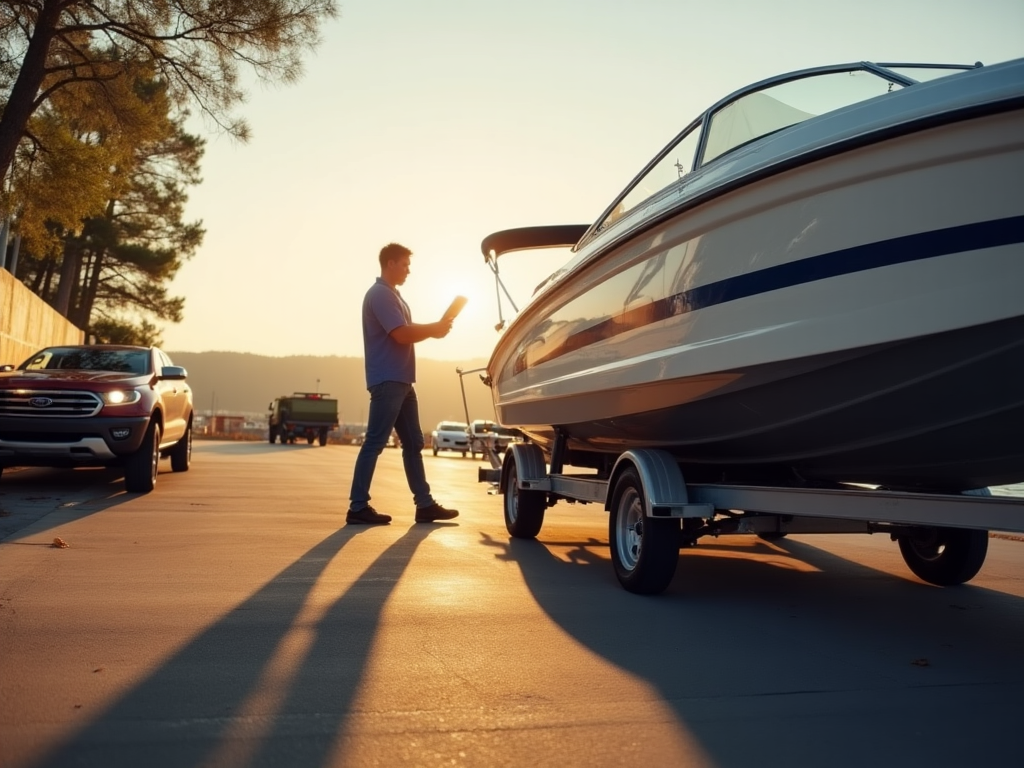
Proactive Strategies and Advanced Maintenance for Hassle-Free Towing
The Maintenance Checklist: Streamlining Your Process
Staying on top of boat trailer care begins with a clear, simple checklist—one that matches your actual usage and environment.
Daily, daily, seasonal, and annual routines each demand unique attention:
- Daily/Pre-Trip: Inspect tires, check all lights, confirm hitch security, look for visible rust or damage
- Seasonal: Deep-clean and rinse trailer (especially if using saltwater), grease bearings, check brake pads and fluid, inspect all wiring
- Annual: Replace worn tires, fully service brakes, inspect frame/bunks/straps, replace critical hardware as needed
Sticking to these checklists can cut surprise repairs by up to 40%, according to towing pros.
Using digital checklist apps—like Google Keep or trailer-specific maintenance trackers—lets you set reminders and sync with your calendar, virtually eliminating missed steps.
Picture this: A push notification pops up on your phone before every planned outing, reminding you to “double-check tire pressure and hitch tension.”
Expert Hacks and Unexpected Insights
Boating veterans swear by a few actionable shortcuts that save hours down the road:
- Use an infrared thermometer for fast bearing-temp checks at rest stops—anything above 120°F may signal trouble
- Spray electrical connectors monthly with marine-grade corrosion inhibitor; moisture is a silent enemy
- Prioritize the “ignored” parts: Winch straps, leaf springs, and bunk carpeting are responsible for nearly 25% of en-route failures, yet are often skipped
- Store with wheels off the ground (using jack stands) during the off-season to prevent flat spots and rust
- DIY fix vs. pro call? Swap out frayed tie-down straps yourself, but leave brake or wiring issues to trained techs when in doubt
“An ounce of prevention beats a surprise tow bill every time.”
Data-Driven Decisions: Saving Time and Money
Neglecting a $40 bearing service can spiral into a $600 wheel replacement after a highway breakdown.
Statistically, trailers with routine annual maintenance report 60% fewer major failures each year.
If you’re thinking long-term, consistent upkeep can add $500+ to resale value and keep vacation plans on track.
Common breakdowns—like tire blowouts or broken springs—are among the top reasons boaters miss on-water days, costing time, money, and peace of mind.
Managing your trailer with intentional, proactive routines is the real maintenance superpower. Set reminders, focus on the often overlooked, and let smart habits—not expensive emergencies—define your towing story.
Integrating Maintenance With Towing Safety and Best Practices
Pre-Trip Preparation for Smooth Launches
Your pre-trip routine is the single biggest factor in towing success. Even experts rely on habit to catch issues early—think of it as a performance checklist for your trailer.
Before every tow, run through these critical steps:
- Balance your load so the boat sits centered and evenly distributed across the trailer axles.
- Confirm tie-down straps, covers, and loose gear are secure—the last thing you want is lost cargo mid-drive.
- Verify tire pressure and tread, remembering that under-inflated tires are responsible for thousands of roadside incidents each year.
- Double-check mirrors for clear sight lines around the trailer—blind spots cause accidents.
- Run a “walk-around check,” inspecting tires, lights, hitch, chains, and wiring connections. Picture this: You spot a frayed safety chain now and prevent a trailer detachment later.
Fact: Most towing failures start with missed steps in pre-trip checks. Building this into your workflow pays off in confidence and control.
“A five-minute walk-around is the difference between a flawless trip and a roadside headache.”
Post-Trip and Launch Procedures: The Ultimate Habit
Care after arrival or launch is just as important as prep. Saltwater and road grime are relentless enemies—routine rinsing adds years to your trailer.
Immediately after use:
- Rinse the trailer, brakes, and wheels—especially after saltwater—to prevent corrosion.
- Wipe down and dry bunks, straps, and wiring—moisture trapped here leads to early failures.
- Store connectors with covers, and consider a corrosion-blocking spray for electrical contacts.
Don’t forget to:
- Reset your maintenance checklist using a mobile app or notes, marking anything that needs attention before the next outing.
- Visual scan underneath for hidden damage or missing fasteners for fast fixes.
- Top off “To Do” items before storage, turning messy buildup into fast, manageable tasks.
Pro Insight: Towing pros treat post-trip care as non-negotiable—a clean trailer is always ready for the next adventure, rain or shine.
“The best way to save money on repairs? Rinse away salt and inspect while memories are fresh.”
The Fast Track to Stress-Free Towing
Strong towing safety isn’t about luck—it’s the result of repeatable routines. A five-minute pre-trip check and a thorough rinse after each launch can cut unexpected repairs by 60% and dramatically extend trailer life.
When you treat maintenance as part of your towing process, every trip starts—and ends—with peace of mind.
“Smooth towing is earned, not given—make inspection and care your most reliable crew.”
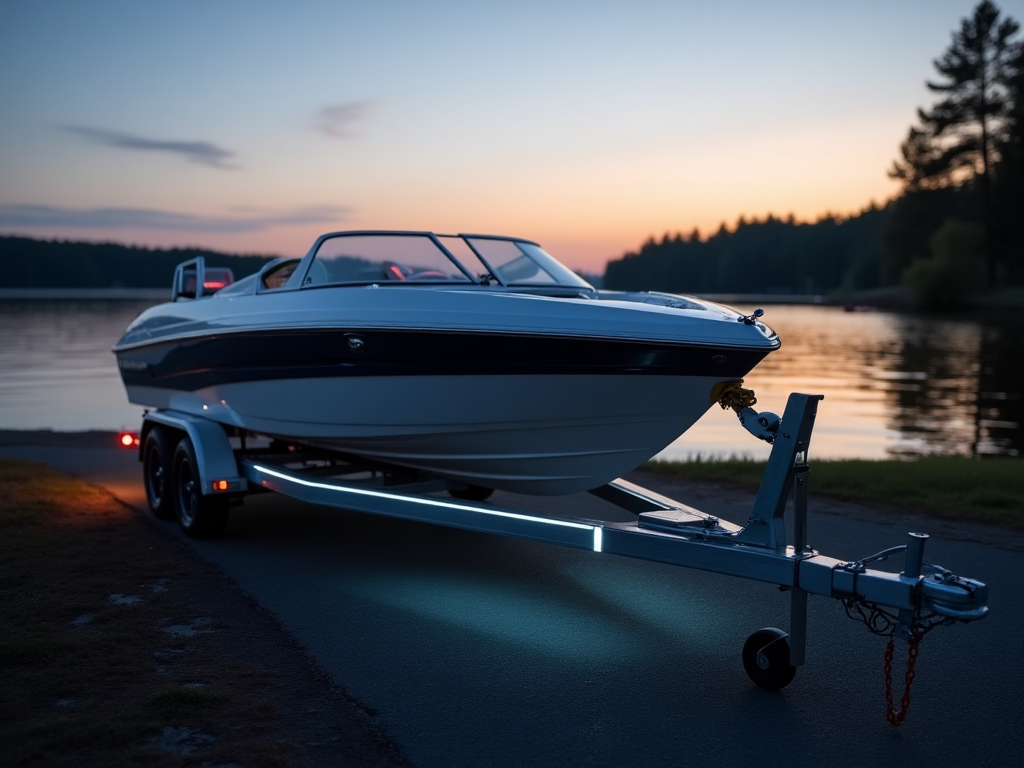
Future-Proofing: Innovations and Upgrades for 2025 and Beyond
Picture this: you pull into the launch ramp, your phone pings an alert—your trailer tire is underinflated by 4 psi. Welcome to 2025, where smart tech means smoother, safer towing and fewer roadside surprises.
Smarter Maintenance With Technology
AI-driven automation and smart sensors are reshaping trailer care, making checklists nearly obsolete.
Today’s leading upgrades include:
- Smart tire pressure monitoring systems that send real-time alerts to your phone—no more guessing or hand-checking before every trip.
- Mobile apps to track inspection schedules, log brake fluid changes, and set reminders for greasing wheel bearings. Some platforms even auto-sync maintenance logs across all your towable gear.
- GPS and load-sensing hitches that monitor tongue weight and help optimize trailer balance on the fly.
A recent market survey found 50% of new trailer buyers in 2024 expected digital maintenance tracking as standard.
Better Protection With New Materials
Old-school steel and carpeted bunks are giving way to corrosion-resistant alloys and synthetic, low-friction bunk covers.
Take corrosion control up a notch:
- Ceramic and nanotech coatings can double the life of your trailer frame and hardware, greatly reducing rust after saltwater launches.
- Waterproof wiring and sealed LED lighting eliminate 90% of common electrical failures—no more post-launch guesswork in the dark.
- Stainless or galvanized brake assemblies now outlast traditional iron by several seasons, even in harsh marine environments.
Swapping to these upgrades can pay for itself in under two seasons, saving an average of $200-$500/year in repairs.
Smart Upgrades for Older Trailers
Don’t retire that trusty hauler just yet. Whether your trailer is five years old or twenty, a few targeted upgrades yield modern reliability:
- Retrofit LED lighting kits for instant visibility and compliance.
- Easy bolt-on tire sensors—often installable in under ten minutes, even for DIYers.
- Modular replacement bunks and anti-corrosion spray coatings to extend hardware life and cut down post-trip scrub time.
These hacks aren’t just about compliance—they deliver peace of mind and better resale value.
Trends and What’s Next
The coming years promise:
- Fully-integrated IoT trailer platforms—think one dashboard for all your towing, lighting, and maintenance needs.
- Automated diagnostics via AI analysis of towing behavior and wear data.
- Industry momentum toward eco-friendly, recyclable trailer components to keep your upgrade choices sustainable.
Adopting these innovations now puts you steps ahead as trailer standards evolve and new tech becomes available.
Upgrading your maintenance game with smart sensors, protective materials, and digital tracking doesn’t just add convenience—it unlocks fewer breakdowns, cleaner launches, and more confident hauls every single trip.
Conclusion
Smart boat trailer maintenance isn’t just about preventing breakdowns—it’s your license to hassle-free adventures and total confidence behind the wheel.
A few consistent habits and a dash of tech will transform towing from a gamble into a system you can trust, every time you hit the road.
If you want every haul to start and end on your terms, make these actions non-negotiable:
- Commit to a five-minute pre-trip inspection—tires, lights, hitch, and safety chains are your must-checks before you ever pull out of the driveway.
- Leverage tech for smarter care: Use digital checklists or mobile app reminders to never miss a critical task.
- Protect against corrosion: Rinse after every saltwater launch and apply corrosion-blocking sprays to wiring and connectors.
- Upgrade for resilience: Consider retrofitting your trailer with LED lighting, smart tire sensors, or corrosion-resistant hardware—these pay off fast.
- Don’t skip the “ignored” spots: Make it a habit to check winch straps, bunks, and springs—they can make or break your next trip.
Ready to future-proof your towing routine? Start today:
- Set reminders on your phone for inspections—before and after every trip.
- Walk around your trailer now and note what needs attention.
- Explore one new upgrade—like tire-pressure monitoring or an eco-friendly corrosion blocker.
Your workflow is your insurance against wasted weekends and costly surprises. With a proactive, tech-savvy approach, maintenance becomes more than a chore—it’s your ticket to stress-free, memorable days on the water.
Smooth towing is earned with every checklist and every rinse—make your next trip the best one yet, and let confidence ride shotgun.

